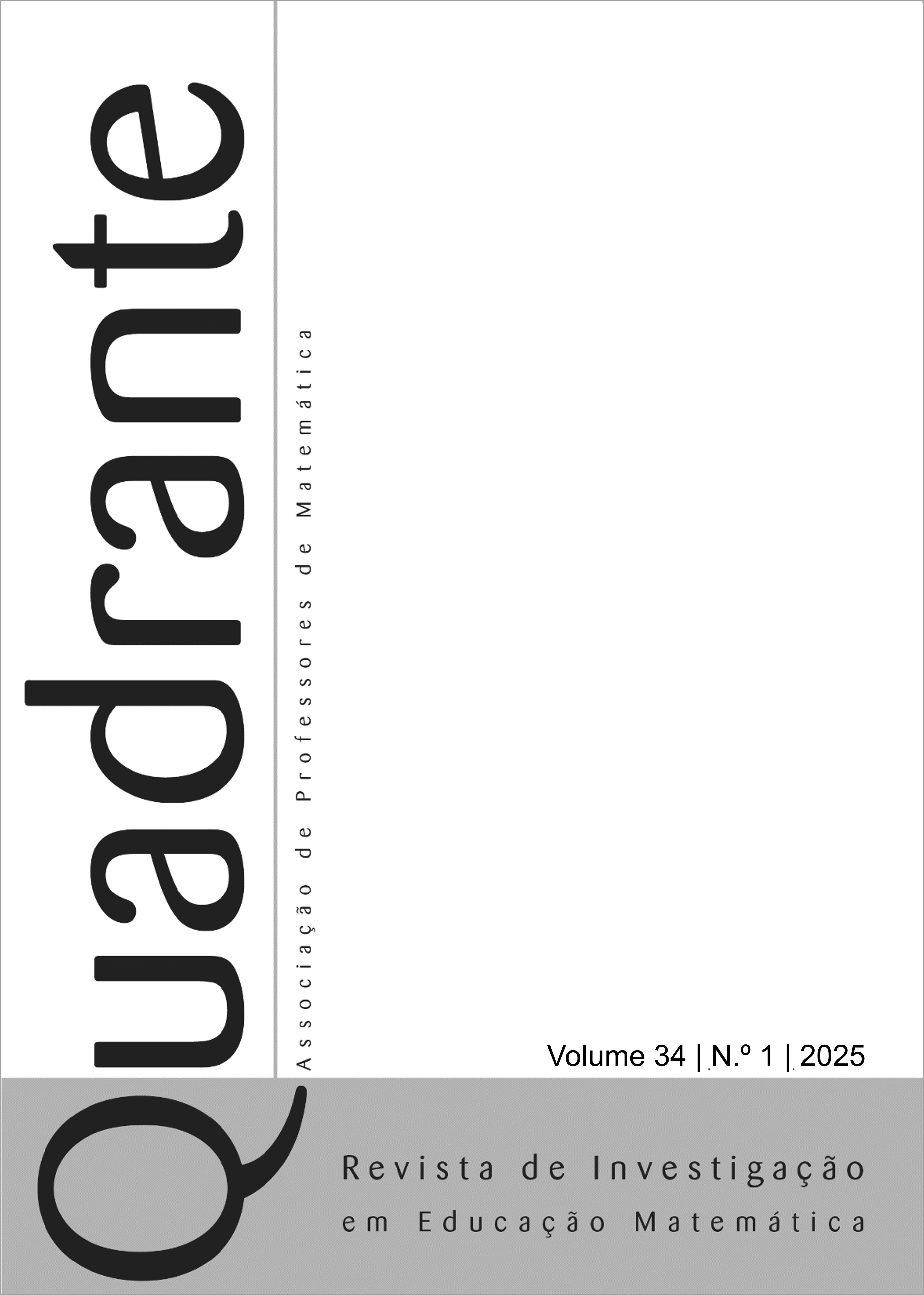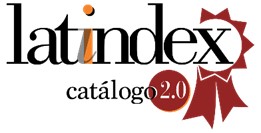Conhecimentos de matemática fora da escola básica ao encontro de problemas algébricos: Uma avaliação antropo-didática
DOI:
https://doi.org/10.48489/quadrante.35562Palavras-chave:
matemática escolar, etnomatemática, matemática extraescolar, praxeologia, antropodidáticaResumo
O estudo examina as contribuições da matemática escolar e da etnomatemática para a matemática fora da escola, analisando as metodologias empregadas para resolver problemas de palavras algébricos práticos. A singularidade deste estudo centrou-se em como os conceitos de técnica e tecnológico na abordagem da Teoria Antropológica da Didática (ATD) foram usados para descobrir certas abordagens etnomatemáticas distintas usadas pelas massas na resolução de problemas práticos de palavras que não estavam bem estabelecidos nos dados disponíveis. Numa abordagem de método misto, os 353 participantes, selecionados por conveniência na Metrópole de Kumasi, demonstraram um verdadeiro entusiasmo ao responder às quatro tarefas propostas por meio de entrevistas e questionários, demonstrando apoio à investigação sobre a sua aprendizagem de Matemática fora da escola básica O estudo constatou que nem todas as pessoas da classe trabalhadora dependem exclusivamente de competências matemáticas ocidentais, mas combinam-nas com a etnomatemática. Alguns entrevistados utilizaram instrumentos simples e facilmente disponíveis para explicar as tarefas, o que pode ser relevante para abordagens de ensino da Matemática. Apesar de aplicarem os conhecimentos escolares de matemática e etnomatemática a problemas de palavras práticos, os resultados foram insatisfatórios. O estudo recomenda a etnomatemática como uma potencial abordagem instrucional intermediáira que pode tornar as aplicações da matemática escolar mais fáceis e mais próximas dos alunos, alavancando a sua cultura e compreensão dos contextos da vida real.
Referências
Albanese, V. (2021). Bundles of ethnomathematical expertise residing with handicrafts, occupations, and other activities across cultures. In M. Danesi (Ed.), Handbook of Cognitive Mathematics (pp. 1–34). Springer. https://doi.org/10.1007/978-3-030-44982-7_2-1
Albanese, V., & Perales, F. J. (2014). Thinking Mathematically: An Ethnomathematics view of the art and crafts practice of Sogueria. Revista Latinoamericana de Investigacion en Mathematica Educativa, 17(3), 261–288. https://doi.org/10.12802/relime.13.1731
Ascher, M. (2017). Ethnomathematics: A Multicultural View of Mathematical Ideas (3rd ed.). Routledge. https://doi.org/10.1201/9780203756522
Barbé, J., Bosch, M., Espinoza, L., & Gascón, J. (2005). Didactic Restrictions on the Teacher’s Practice: The Case of Limits of Functions in Spanish High Schools. Educational Studies in Mathematics, 59(1), 235–268. https://doi.org/10.1007/s10649-005-5889-z
Berggren, E., Olteanu, C., Perez, M., & Sollervall, H. (2023). Praxeologies-in-action during struggle with problem-solving. In P. Drijvers, C. Csapodi, H. Palmér, K. Gosztonyi, & E. Kónya (Eds.), Proceedings of the Thirteenth Congress of the European Society for Research in Mathematics Education (CERME13) (Vol. TWG14, Issue 4). Alfréd Rényi Institute of Mathematics. https://hal.science/hal-04404308
Błaszczyk, P. (2005). On the Mode of Existence of the Real Numbers. In A.-T. Tymieniecka (Ed.), Logos of Phenomenology and Phenomenology of the Logos. Book One: Phenomenology as the Critique of Reason in Contemporary Criticism and Interpretation (Vol. 88, pp. 137–155). Springer. https://doi.org/10.1007/1-4020-3680-9_8
Booth, J., Barbieri, C., Eyer, F., & Pare-Blagoev, E. (2014). Persistent and Pernicious Errors in Algebraic Problem Solving. The Journal of Problem Solving, 7(1), 10–23. https://doi.org/10.7771/1932-6246.1161
Bosch, M., & Gascón, J. (2014). Introduction to the Anthropological Theory of the Didactic (ATD). In A. Bikner-Ahsbahs & S. Prediger (Eds.), Networking of Theories as a Research Practice in Mathematics Education (pp. 67–83). Springer. https://doi.org/10.1007/978-3-319-05389-9_5
Bunge, M. (2003). Emergence and Convergence: Qualitative Novelty and the Unity of Knowledge. University of Toronto Press.
Castela, C., & Romo, A. (2019). Developments and functionalities in the praxeological model. In Working with the Anthropological Theory of the Didactic in Mathematics Education (pp. 79–130). Routledge. https://doi.org/10.4324/9780429198168-4
Chaachoua, H., Bessot, A., Romo, A., & Castela, C. (2019). Developments and Functionalities in the Praxeological Model. In Working with the Anthropological Theory of the Didactic in Mathematics Education (1st ed.). Routledge.
Chevallard, Y. (2019). Introducing the Anthropological Theory of the Didactic: An Attempt at a Principled Approach. Hiroshima Journal of Mathematics Educatiion, 12(1), 71–119.
Chevallard, Y., & Bosch, M. (2020). Anthropological Theory of the Didactic (ATD). In S. Lerman (Ed.), Encyclopedia of Mathematics Education (pp. 53–61). Springer. https://doi.org/10.1007/978-3-030-15789-0_100034
Creswell, J. W. (2015). Educational Research: Planning, Conducting and Evaluating Quantitative and Qualitative Research, Enhanced Pearson eText with Loose-Leaf Version. In Pearson Education, Inc. (5th ed.). Pearson Education, Inc.
Creswell, J. W., & Plano Clark, V. L. (2011). Designing and Conducting Mixed Methods Research (2nd ed.). Sage. https://us.sagepub.com/en-us/nam/designing-and-conducting-mixed-methods-research/book241842
D’Ambrosio, U. (1990). Etnomatemática. (Ethnomathematics) (1st ed.). Editora Ática.
D’Ambrosio, U. (2001). What is ethnomathematics, and how can it help children in schools? Teaching Children Mathematics, 7, 308–310. https://doi.org/10.5951/TCM.7.6.0308
Diego-Mantecón, J. M., Haro, E., Blanco, T. F., & Romo-Vázquez, A. (2021). The chimera of the competency-based approach to teaching mathematics: A study of carpentry purchases for home projects. Educational Studies in Mathematics, 107(2), 339–357. https://doi.org/10.1007/s10649-021-10032-5
Doerr, H. M., & English, L. D. (2006). Middle Grade Teachers’ Learning through Students’ Engagement with Modeling Tasks*. Journal of Mathematics Teacher Education, 9(1), 5–32. https://doi.org/10.1007/s10857-006-9004-x
Dorier, J.-L., & García, F. J. (2013). Challenges and opportunities for the implementation of inquiry-based learning in day-to-day teaching. ZDM, 45(6), 837–849. https://doi.org/10.1007/s11858-013-0512-8
Fantinato, M. C. de C. B. (2004). Quantitative and Spatial Representations among Working Class Adults from Rio de Janeiro. The 10th International Congress of Mathematics Education, 1, 29–38.
Filloy, E., Rojano, T., & Solares, A. (2004). Arithmetic/Algebraic Problem-Solving and the Representation of Two Unknown Quantities. Proceedings of the 28th Conference of the International Group for the Psychology of Mathematics Education, 2(1), 391–398. IGPME.
FitzSimons, G. E., & Björklund Boistrup, L. (2017). In the workplace mathematics does not announce itself: Towards overcoming the hiatus between mathematics education and work. Educational Studies in Mathematics, 95(3), 329–349. https://doi.org/10.1007/s10649-017-9752-9
Font, V., Godino, J. D., & Gallardo, J. (2013). The emergence of objects from mathematical practices. Educational Studies in Mathematics, 82(1), 97–124. https://doi.org/10.1007/s10649-012-9411-0
Gay, G. (2000). Culturally responsive teaching: Theory, research, and practice. Teachers College Press.
Godino, J. D., & Batanero, C. (1998). Clarifying the Meaning of Mathematical Objects as a Priority Area for Research in Mathematics Education. In A. Sierpinska & J. Kilpatrick (Eds.), Mathematics Education as a Research Domain: A Search for Identity: An ICMI Study Book 1. An ICMI Study Book 2 (pp. 177–195). Springer Netherlands. https://doi.org/10.1007/978-94-011-5470-3_12
Godino, J. D., Batanero, C., & Font, V. (2007). The onto-semiotic approach to research in mathematics education. ZDM, 39(1), 127–135. https://doi.org/10.1007/s11858-006-0004-1
Godino, J. D., Font, V., Wilhelmi, M. R., & Lurduy, O. (2011). Why is the learning of elementary arithmetic concepts difficult? Semiotic tools for understanding the nature of mathematical objects. Educational Studies in Mathematics, 77(2), 247–265. https://doi.org/10.1007/s10649-010-9278-x
Graesser, A., Foltz, P. W., Rosen, Y., Shaffer, D. W., Forsyth, C., & Germany, M.-L. (2018). Challenges of Assessing Collaborative Problem Solving. In E. Care, P. Griffin, & M. Wilson (Eds.), Assessment and Teaching of 21st Century Skills: Research and Applications (Vol. 2, pp. 75–91). Springer. https://doi.org/10.1007/978-3-319-65368-6_5
Grigoraş, R., Garcia, Fco. J., & Halverscheid, S. (2011). Examining Mathematising Activities in Modelling Tasks with a Hidden Mathematical Character. In G. Kaiser, W. Blum, R. Borromeo Ferri, & G. Stillman (Eds.), Trends in Teaching and Learning of Mathematical Modelling (pp. 85–95). Springer. https://doi.org/10.1007/978-94-007-0910-2_10
Hidayati, F. N., & Prahmana, R. C. I. (2022). Ethnomathematics’ Research in Indonesia during 2015-2020. Indonesian Journal of Ethnomathematics, 1(1), Article 1.
Hoogland, K., de Koning, J., Bakker, A., Pepin, B. E. U., & Gravemeijer, K. (2018). Changing representation in contextual mathematical problems from descriptive to depictive: The effect on students’ performance. Studies in Educational Evaluation, 58, 122–131. https://doi.org/10.1016/j.stueduc.2018.06.004
Howker, E., & Black, L. (2025). The role of everyday mathematics in parent and caregiver experiences of alienation from school mathematics. Educational Studies in Mathematics. https://doi.org/10.1007/s10649-025-10406-z
Ishibashi, I., & Uegatani, Y. (2022). Cultural relevance of validation during mathematical modeling and word problem-solving: Reconceptualizing validation as an integration of possible fictional worlds. The Journal of Mathematical Behavior, 66(1), 100934. https://doi.org/10.1016/j.jmathb.2022.100934
Ju, M.-K., Moon, J.-E., & Song, R.-J. (2016). History of Mathematics in Korean Mathematics Textbooks: Implication for Using Ethnomathematics in Culturally Diverse School. International Journal of Science and Mathematics Education, 14(7), 1321–1338. https://doi.org/10.1007/s10763-015-9647-0
Karen, F. (2009). The Role of Ethnomathematics within Mathematics Education. Sixth Congress of the European Society for Research in Mathematics Education, 6, 1517–1526.
Kikas, E., Anu Palu, K. P., & Afanasjev, J. (2009). The role of individual and contextual factors in the development of maths skills. Educational Psychology, 29(5), 541–560. https://doi.org/10.1080/01443410903118499
Lave, J. (2019). Learning and Everyday Life: Access, Participation, and Changing Practice. Cambridge University Press. https://doi.org/10.1017/9781108616416
Marchive, A. (2005). The Frameworks of School Experience: An Anthropo-Didactic Approach to the Phenomena of Mathematics Teaching. CERME, 4, 1516–1525.
Monteiro, A., & Nacarato, A. M. (2004). Relações entre Saber Escolar e Saber Cotidiano: Apropriações discursivas de futuros professores que ensinarão Matemática. Bolema - Boletim de Educação Matemática, 17(22), Article 22.
Nasir, N. S., Hand, V., & Taylor, E. V. (2008). Culture and mathematics in school: Boundaries between cultural and domain knowledge in the mathematics classroom and beyond. Review of Research in Education, 32(1), 187–240.
OECD. (2015). PISA 2015 Results (Volume I): Excellence and Equity in Education (Vol. 1). Organisation for Economic Co-operation and Development. https://doi.org/10.1787/9789264266490-en
Oppong-Gyebi, E., Bonyah, E., & Clark, L. J. (2023). Constructive instructional teaching and learning approaches and their mathematical classroom teaching practices: A junior high school perspective. Contemporary Mathematics and Science Education, 4(1), ep23002. https://doi.org/10.30935/conmaths/12541
Ortiz-Laso, Z., & Diego-Mantecón, J.-M. (2020). Strategies of Pre-Service Early Childhood Teachers for Solving Multi-Digit Division Problems. Sustainability, 12(10217), 1–20. https://doi.org/10.3390/su122310217
Öztürk, M. (2021). An embedded mixed method study on teaching algebraic expressions using metacognition-based training. Thinking Skills and Creativity, 39(1). https://doi.org/10.1016/j.tsc.2021.100787
Pais, A. (2011). Criticisms and contradictions of ethnomathematics. Educational Studies in Mathematics, 76(2), 209–230. https://doi.org/10.1007/s10649-010-9289-7
Popovic, G., & Lederman, J. S. (2015). Implications of informal education experiences for mathematics teachers’ ability to make connections beyond formal classroom. School Science and Mathematics, 115(3), 129–140. https://doi.org/10.1111/ssm.12114
Powell, A. B., & Frankenstein, M. (1997). Ethnomathematics: Challenging Eurocentrism in Mathematics Education. SUNY Press.
Pradana, K. C., Putra, A. R., & Rahmawati, Y. (2022). Ethnomathematics on Traditional Culture: A Bibliometric Mapping Analysis and Systematic Review on Database Scopus. International Journal Corner of Educational Research, 1(1), Article 1. https://doi.org/10.54012/ijcer.v1i1.61
Putra, Z. H. (2016). Evaluation of Elementary Teachers’ Knowledge on Fraction Multiplication using Anthropological Theory of the Didactics. 13th International Congress on Mathematic Education, 1, 24–31.
Putra, Z. H. (2019). Elementary Teachers’ Knowledge on Fraction Multiplication: An Anthropological Theory of the Didactic Approach. Journal of Teching and Learning in Elementary Education (JTLEE), 2(1), Article 1. https://doi.org/10.33578/jtlee.v2i1.6964
Putra, Z. H., & Witri, G. (2017). Anthropological Theory of The Didactic (ATD) A New Research Perspective On Didactic Mathematics in Indonesia. Jurnal Pigur, 2(1), 7.
Rajotte, T., Germain, M.-P., Beaupre, S., & Dufour, R. (2021). The Interpretation and Screening of Learning Difficulties in Mathematics: Regard at the Contribution of the Anthropo-Didactic Approach. International Journal of Elementary Education, 10(3), Article 3. https://doi.org/10.11648/j.ijeedu.20211003.11
Rodríguez, E., Bosch, M., & Gascón, J. (2008). A networking method to compare theories: Metacognition in problem solving reformulated within the Anthropological Theory of the Didactic. ZDM, 40(2), 287–301. https://doi.org/10.1007/s11858-008-0094-z
Rosa, M. (2020). An overview of diverse mathematical practices in Brazil: an ethnomathematical perspective in action. In M. Rosa & C. Coppe de Oliveira (Eds.), Ethnomathematics in action: Mathematical practices in Brazilian indigenous, urban and afro communities (pp. 3–22). Springer. https://doi.org/10.1007/978-3-030-49172-7_1
Schmidt, R. (2016). The methodological challenges of practising praxeology. In Practice Theory and Research (1st ed., p. 17). Routledge.
Schoenfeld, A. H. (2007). Problem solving in the United States, 1970–2008: Research and theory, practice and politics. ZDM, 39(5), 537–551. https://doi.org/10.1007/s11858-007-0038-z
Sommerauer, P., & Müller, O. (2014). Augmented reality in informal learning environments: A field experiment in a mathematics exhibition. Computers & Education, 79, 59–68. https://doi.org/10.1016/j.compedu.2014.07.013
Utami, N. S., Prabawanto, S., & Priatna, N. (2022). A didactical design for introducing the concepts in algebraic forms using the theory of praxeology. Beta: Jurnal Tadris Matematika, 15(1), Article 1. https://doi.org/10.20414/betajtm.v15i1.508
Verschaffel, L., De Corte, E., & Lasure, S. (1994). Realistic considerations in mathematical modeling of school arithmetic word problems. Learning and Instruction, 4(4), 273–294. https://doi.org/10.1016/0959-4752(94)90002-7
Wilson, J., & Clarke, D. (2004). Towards the modelling of mathematical metacognition. Mathematics Education Research Journal, 16(2), 25–48. https://doi.org/10.1007/BF03217394











